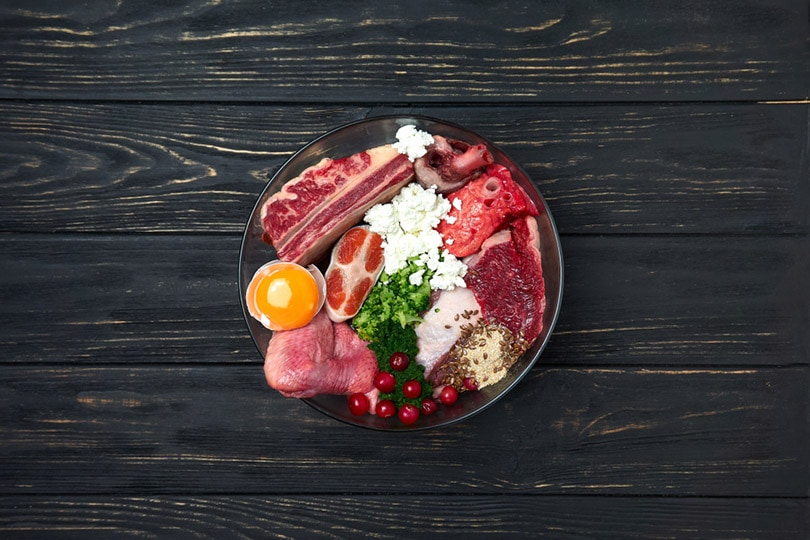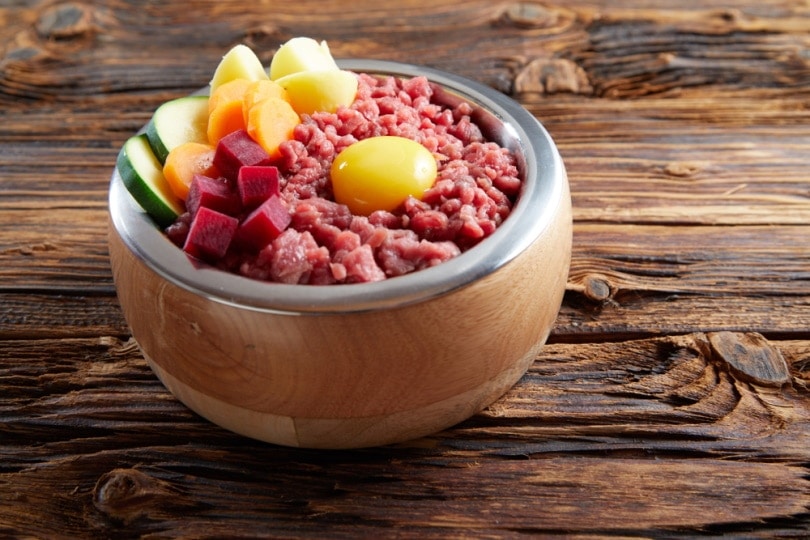
Click to Skip Ahead
Cat food has come a long way over the years. Recently, a number of people have turned to the raw food industry as an answer for all of their cat’s health problems. Supporters of raw food claim that their cats are healthier, happier, and more energetic since making the switch to raw. Many veterinarians aren’t convinced. Many veterinarians, this one included, feel the risks of feeding a raw food diet to your cat far outweigh any benefits that you may see.
What is a Raw Diet?
A raw diet consists of feeding your cat raw, uncooked, and/or unprocessed meat, organ tissue, and bones. Some raw diets will be freeze-dried or dehydrated, but the theme is the same—the food is completely uncooked and unprocessed.
Why is Feeding Raw So Concerning?
To date, there is not a single peer-reviewed, scientific study proving raw diets to be superior to a commercial diet. Most claims of improved health are anecdotal, at best.
Raw diets are full of bacteria. For the same reasons why menus at many restaurants have to put in disclaimers and warnings for people eating raw or undercooked food, the same goes for animals. Many raw diets have exceptionally high levels of salmonella, e. coli and listeria. All of these bacteria can cause severe illness in animals, not to mention, in people as well.
When preparing and handling raw pet foods, people have to be extremely careful they do not cross-contaminate their own food prep areas, and that kids in the house aren’t touching these areas or the food bowls. Children and immunocompromised individuals can become extremely sick, some infections proving fatal.

In addition to the high levels of bacteria, bone pieces can cause trauma to the teeth, and pieces can become lodged in the intestinal tract. These pieces can cause stomach ulcers, gastrointestinal foreign bodies (objects that become stuck and have to be surgically removed), or even poke through the intestinal tract.
Another concern for veterinarians is being able to provide your cat with a well-balanced diet. Making sure your cat has the proper amounts of vitamins, minerals, protein, fat, and carbohydrates is a complex process. Taurine deficiency in cats can cause severe heart disease (which can lead to death), blindness, and fetal abnormalities. Commercial diets have been revamped over the years to make sure that there is sufficient taurine in their diets. Feeding your cat a raw diet may leave them not only taurine deficient, but deficient in other amino acids, minerals, or vitamins as well.
What About Raw Seafood? Is it the Same as Sushi That People Eat?
Raw seafood and fish is very dangerous to eat—for humans and pets alike. Even if you go to the “best” sushi restaurant in your city, you can still become extremely sick from parasites or bacterial growth.
Bacteria will grow much quicker and easier in certain temperatures (depends on the type of bacteria). When seafood is not kept at that specific, constant temperature, any animal that eats it can be at risk for a bacterial infection. Depending on the bacteria, this can lead to vomiting, diarrhea, or even require hospitalization as the bacteria invade your organs. As such, feeding raw fish to your cat poses a huge risk for severe bacterial infection.

What If My Cat Hunts and Kills Mice and Birds? Same Thing Right?
Cats who are strictly outdoors, or indoor/outdoors, will often hunt and kill small rodents, rats, and even birds. Cats often like the thrill of the hunt, and will leave these animals to their owners as gifts. But many cats won’t ingest an entire kill. If they do, these cats are still at risk for salmonella, e. coli, and other bacterial poisoning.
For instance, when birds have songbird fever, this refers to being infected with salmonella. This can then cause severe salmonella infection in any animal that kills and/or eats the bird, such as your cat.
Cats who ingest an entire small rodent and/or bird can have trouble ingesting and digesting feathers, bones, and large portions of raw muscle tissue. These pieces can become stuck, causing severe trauma to the gastrointestinal tract. Some pieces may even need to be surgically removed. In addition, a pet who eats a large amount of bones can become severely constipated as they pass those bone pieces through their intestinal tract.
What If I Don’t Want My Cat Eating “By-Products”?
When you read a pet food label and it says “by-products”, or “Animal by-products”, this simply means organ meat (such as kidney, spleen, and liver), ground bones (sometimes referred to separately as bone meal), and tissue besides the muscle mixed into the food. These by-products can provide great nutrients including minerals, vitamins, and additional protein. When mixed into commercial pet food, they are processed and ground, so that cats can easily digest and process them through the GI tract.
These by-products are often included in a raw diet as well—so your cat is eating them in both diets. However, in raw diets, these organs and bones may not be processed to be safe for consumption. Large bone pieces, feathers,and raw organ meats can be harmful to your cat, and even cause trauma as they try to chew and eat them.
Conclusion
Raw pet food is a diet many veterinarians will not support. To date, there are no peer-reviewed articles supportive of raw diets over commercial diets. Veterinarians see many pets infected with dangerous bacterial levels due to raw diets, in addition to trauma to the GI tract. Speaking with your veterinarian about a well-balanced commercial diet for your cat’s specific needs will be a much safer option for your cat.
Featured Image Credit: Zontica, Shutterstock








